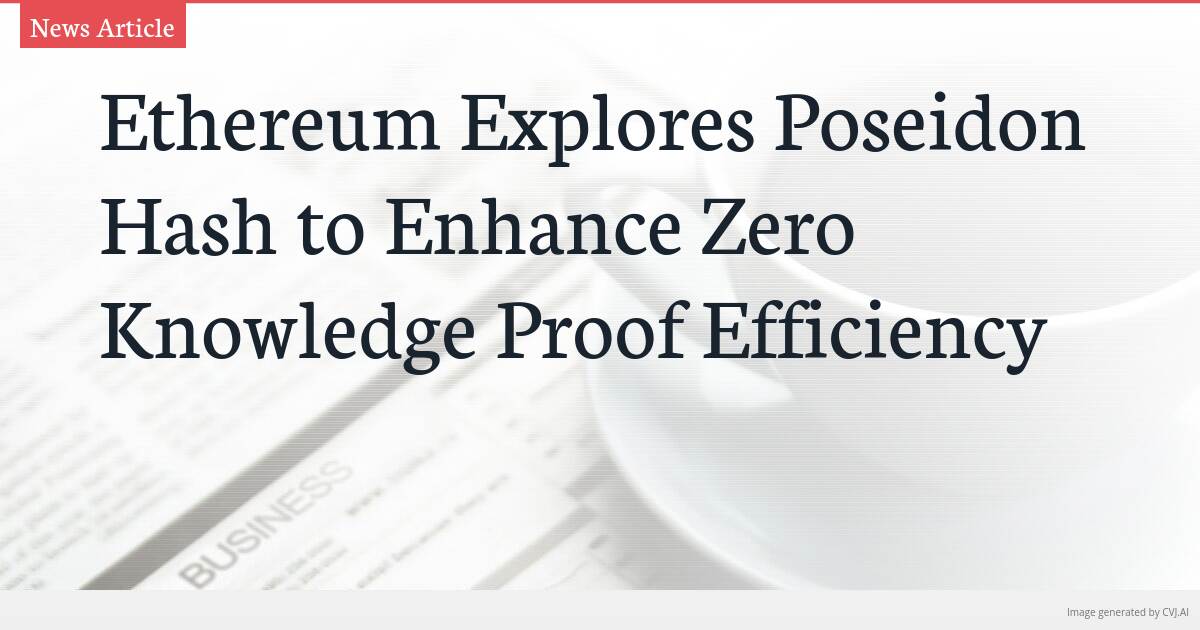This summary text is fully AI-generated and may therefore contain errors or be incomplete.
Ethereum is at the forefront of blockchain innovation, particularly in the realm of zero-knowledge (ZK) proofs. The exploration of new cryptographic methods, such as the Poseidon hash function, is crucial for enhancing the network’s efficiency and security.
Poseidon Hash Function
Vitalik Buterin, a co-founder of Ethereum, has highlighted the importance of thoroughly investigating the Poseidon hash function, which is tailored for ZK applications. Understanding Poseidon’s security properties is essential as the network considers transitioning to this hash function to improve zk-prover friendliness.
The deadline for a security analysis program for Poseidon has been extended to March 15, inviting contributions from cryptographers for this critical evaluation. This initiative underscores the community’s commitment to ensuring the robustness of new technologies before their adoption.
Efficiency and Performance
Poseidon is distinct from traditional hash functions like SHA-256 due to its optimization for zero-knowledge proofs. This cryptographic method allows for transaction verification without disclosing sensitive information, which is increasingly vital for Ethereum’s scaling solutions, particularly rollups.
- Rollups manage transactions off-chain before finalizing them on the main blockchain.
- Poseidon’s efficiency could significantly lower computational costs.
- This improvement could enhance the speed and accessibility of these solutions.
Recent benchmarks have positioned Poseidon as a leading performer, indicating its potential application in various Ethereum Layer 1 protocols that utilize ZK proofs. However, the community remains divided on its adoption, weighing the benefits against potential drawbacks.
Community Perspectives
Some members of the Ethereum community view Poseidon as a promising advancement for the network’s efficiency. Conversely, others express skepticism regarding its performance and flexibility, raising concerns about whether the advantages of Poseidon outweigh its limitations.
- Various configurations of Poseidon could limit options for succinct non-interactive arguments of knowledge (SNARKs).
- Poseidon is significantly slower than alternative hash functions like Blake and Keccak.
This performance issue could create bottlenecks unless Layer 2 solutions adapt for compatibility. A Layer 2 project that initially integrated Poseidon has decided to revert to the Merkle Patricia Tree (MPT) with Keccak in a future upgrade, citing performance as a key factor in this decision.
Future Considerations
The ongoing debate within the community about the trade-offs involved in adopting new cryptographic technologies illustrates the complexities of implementing advancements. As Ethereum seeks to improve its scalability and efficiency, the discussions surrounding Poseidon are particularly relevant.
The balance between security, performance, and flexibility remains a vital consideration for developers and stakeholders. The outcomes of the security analysis program and the community’s response to Poseidon will likely shape Ethereum’s future direction in the competitive blockchain landscape.
📎 Read the original article on cryptoslate.com


